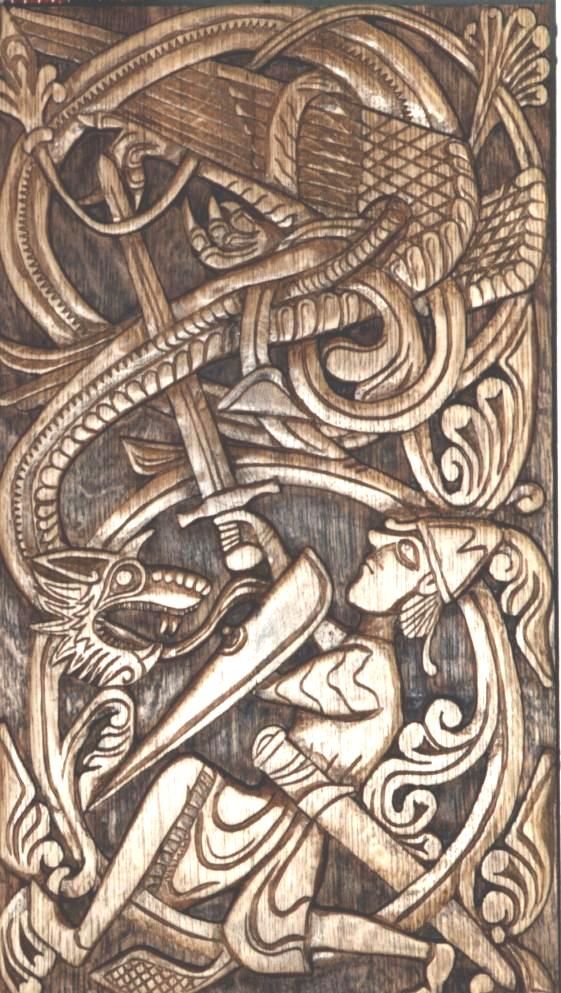Richard Fahey discusses the Sigemund-episode in Beowulf, in relation to the Vǫlsung legend, in his translator’s preface.

Beowulf, 874-900:
Welhwylc gecwæð
þæt he fram Sigemundes secgan hyrde
ellendædum, uncuþes fela,
Wælsinges gewin, wide siðas,
þara þe gumena bearn gearwe ne wiston,
fæhðe ond fyrena, buton Fitela mid hine,
þonne he swulces hwæt secgan wolde,
eam his nefan, swa hie a wæron
æt niða gehwam nydgesteallan;
hæfdon ealfela eotena cynnes
sweordum gesæged. Sigemunde gesprong
æfter deaðdæge dom unlytel,
syþðan wiges heard wyrm acwealde,
hordes hyrde. He under harne stan,
æþelinges bearn, ana geneðde
frecne dæde, ne wæs him Fitela mid.
Hwæþre him gesælde ðæt þæt swurd þurhwod
wrætlicne wyrm, þæt hit on wealle ætstod,
dryhtlic iren. Draca morðre swealt.
Hæfde aglæca elne gegongen
þæt he beahhordes brucan moste
selfes dome. Sæbat gehleod,
bær on bearm scipes beorhte frætwa,
Wælses eafera. Wyrm hat gemealt.
Se wæs wreccena wide mærost
ofer werþeode, wigendra hleo,
ellendædum (he þæs ær onðah),
siððan Heremodes hild sweðrode,
eafoð ond ellen.
The standard critical edition of this text can be found in Klaeber’s Beowulf (Fourth Edition), ed. Robert D. Fulk, Robert E. Bjork, John D. Niles. University of Toronto Press. 2008; a reproduced edition is also available online.
“The Lay of Sigemund”: A Modern English Translation by Richard Fahey
Translator’s Preface
“He told everything that he heard said
about the valorous deeds of Sigemund,
much unknown:
The struggle of Wælsing,
wide journeys, feuds and crimes,
of which the sons of men did not readily know,
except Fitela with him.
Then he would say such things,
uncle to his nephew,
as they were always companions in need
through every hostility.
They had put an entire race of giants to the sword.
No little glory spread about Sigemund
after his death-day,
since the war-hardened one
killed the serpent,
the guardian of the hoard.
He, the child of a prince,
risked that reckless deed alone,
under grey stone.
Fitela was not with him.
However, it happened for him that
his sword struck through the marvelous serpent,
so that it pierced through to the wall,
that lordly iron.
The dragon died by murder.
The fearsome marauder had gained valor,
so that he might enjoy of the ring-hoard
by his own judgment.
The heir of Wæl loaded the sea-boat,
bore bright treasure into the bosom of the ship.
The hot serpent melted.
He was widely the most famous of exiles,
throughout the people of men,
the protector of warriors with valorous deeds,
he prospered before by these,
since Heremod’s battle,
strength and valor dwindled.”
Audio Recordings in Old and Modern English:
Richard Fahey
PhD Candidate
University of Notre Dame
